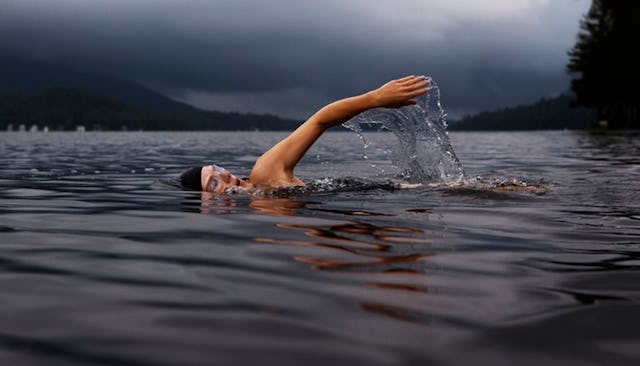6 Lessons Our Children Can Learn From The Olympics

I was 11 years old when Janet Evans competed in the 1988 Olympics, winning gold in three swimming events. As a scrawny distance swimmer, like Evans, I was captivated. I sat in front of our tiny television and studied Evans’ unconventional swimming stroke. I read the newspaper every morning, looking for her splits and calculating how many seconds I would need to shave off my time in the 800-meter freestyle event to be as fast as her. I devoured stories about her seemingly ordinary life as a teenager living in a seemingly ordinary suburb in California. I loved Janet Evans. I wanted to be Janet Evans.
Of course I wasn’t, but because of the magic of the Olympics, I was dreamy enough and determined enough to think that one day, being one of the fastest women in the water might actually be in my future. The Olympics (and my girl-crush on Janet Evans) taught me a lot as a child — lessons that have been reinforced over the years. Now, as I watch the Olympics with my sons, I hope that they will learn some of those same lessons.
1. No one does it alone.
It might look like the swimmer touching the wall first, or the sprinter leaping over the hurdles fastest, or the gymnast swinging from the bars the highest are responsible for their own successes — and they are. However, no one achieves success alone. Behind the athlete standing on the podium, there are coaches who guided them along their path, parents who drove them to practice at 5 a.m., and teammates who cheered them on along the way. Bottom line: Thank your parents for driving your ass to practices and spending a small fortune on sports gear.
2. Don’t be an asshole, and be wary of assholes in disguise.
Pay attention to what the athletes do before and after the race. Do they shake their competitor’s hand? Do they throw their goggles across the pool? Do they show humility while feeling confident? Are they humble in victory and gracious in defeat? These are the traits that shine through, regardless of the time on the clock, the score on the board, or the medal around someone’s neck. Success at this level takes a fierce competitiveness, rock solid determination, and unshakable confidence — but those traits do not entitle you to be an asshole. Success — whether in a sport or a career or anything else — isn’t worth it if you have to be an asshole to get there.
3. There are a lot of ways to kick ass.
One of the reasons I love the Olympics so much is because, as a former competitive swimmer, this is the one time every four years when my favorite sport is finally cool. Most of the time our collective attention focuses on sports like football, basketball, and baseball, and no one pays any attention to the people kicking ass in sports like swimming and fencing and rugby. But during the Olympics, these lesser-known sports are given their time to shine. I want my children to learn that just like there are many different sports, there are many different ways to kick ass. Find your niche and own it — whether it’s popular or not, whether the stadium is filled or there are only a handful of people in the stands, and whether anyone else appreciates it or not. Do what you love and kick ass doing it.
4. Working toward a dream isn’t always dreamy.
There were days when I absolutely hated getting in the water — I mean hated it. I guarantee that every athlete on the podium has had days when they absolutely despise what they are doing. There are days when they think about quitting. There are days when they do quit. But there are more days when they remember their dream and they keep working for it. Whether my kids dream of becoming a baseball player or a teacher or a doctor, I want them to learn that they might not always enjoy the process, but hard work and discomfort doesn’t make a dream any less worthy.
5. The world is really freaking big.
It’s so easy to feel like the world is only as big as the little bubble that we live in. It’s hard to imagine what life is like on the other side of town, let alone the other side of the world. But the Olympics remind us that the world is a big place, filled with lots of different people and cultures and ideas.
6. We can make the big world smaller.
As big as the world is, the Olympics can also teach our children that we can make the world smaller by connecting with people on a human level and finding those common pieces of humanity that tie us together. We make our big world smaller by building bridges and connecting people. We are more alike than different, after all.
Whether or not you’re a sports fan, there are a lot of things to love about the Olympics: the teamwork and camaraderie, the multiculturalism and national pride, the inspiration and drama. Those things are great, but one of the things I love the most about the Olympics is the way it shows children and adults the strength and depth of our shared humanity, and what can accomplish when we cut the bullshit and come together.
This article was originally published on